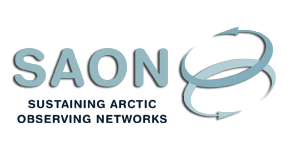Sustaining Arctic Observing Networks
- Home/
- Events/
- Geo Week 2022 /
- Statements/
- Full Statement
Group on Earth Observations – GEO Week 2020
Arctic PASSION
The rapid ongoing changes in the Arctic present an urgent need to better observe, characterize and quantify processes and properties of the Arctic system. Full integration of ground-based and satellite observing systems is fundamental to achieving this overarching target. ArcticGEOSS will offer policy-relevant services as the link from the observing system to societal benefits. The need for this link has been identified in the International Arctic Observations Assessment Framework (IAOAF, 2017).
The need is well document in IPCC reports, most recently stated in the IPCC "Special Report on the Ocean and Cryosphere in a Changing Climate" (SROCC): Over the last decades, global warming has led to widespread shrinking of the cryosphere, with mass loss from ice sheets and glaciers (very high confidence), reductions in snow cover (high confidence) and Arctic sea ice extent and thickness (very high confidence), and increased permafrost temperature (very high confidence). This impacts heavily on societies in the Arctic: Since the mid-20th century, the shrinking cryosphere in the Arctic and high mountain areas has led to predominantly negative impacts on food security, water resources, water quality, livelihoods, health and well-being, infrastructure, transportation, tourism and recreation, as well as culture of human societies, particularly for Indigenous peoples (high confidence). Costs and benefits have been unequally distributed across populations and regions. Adaptation efforts have benefited from the inclusion of Indigenous knowledge and local knowledge (high confidence). The need to act in the Arctic to monitor climate change and help people to adapt is imminent.
There are shortcomings in the coordination of Arctic observations that are maintained by many national and organizational institutions. This coordination gap has hampered partnership development and investments toward improved observing and data systems. The "Sustaining Arctic Observing Networks’ (SAON) Roadmap for Arctic Observing and Data Systems (ROADS)" (see Sandy Starkweather et al. (2021)) address this shortcoming through generating a systems-level view of observing requirements and implementation strategies. ROADS is both a comprehensive concept, building from a societal benefit assessment approach, and one that can proceed step-wise so that the most imperative Arctic observations (described as shared Arctic variables (SAVs)) can be rapidly improved. The ROADS process and the SAV concept has been a driver for establishing Arctic PASSION and initiate the development of the pilot services described herein. ArcticGEOSS is seeking to be strong in engaging end users to make EO impactful.
ArcticGEOSS will contribute to GEO through the development of these pilot services, developed within Arctic PASSION and by University of Alaska, Fairbanks, USA:
- Integrated Fire Risk Management Pilot Service: This project aims to develop an integrated web-based system that, through collecting data and coupling physical and parametric models, will support the prevention and evaluation of the risk of wildfire; the sighting and monitoring of wildfires; emergency management of shutdown operations; post-event management and damage assessment. Information layers and outputs will include: risk maps, vegetation stress map, fire weather forecasts, fuel map, early identification of outbreaks, and short-term evolution of the fire event. Information and alarms can be distributed to citizens and communities.
- Pan-Arctic requirements-driven Permafrost Service: The objective of this pilot service is to provide a new service reporting on temperature and active layer changes which will underpin the Global Terrestrial Network for Permafrost (GTN-P); to provide near real time maps of surface changes related to permafrost thaw at high resolution available to all stakeholders; and build on ESA and Copernicus remote sensing products.
- Improving safety for shipping in the polar seas: This project focuses on three outputs. First, use historic ship traffic data to assess shipping traffic. The second goal is to deliver near real time sea ice conditions assessment (ice charts, satellite imagery). The final goal is to use forecasted sea ice information to deliver forecasted sea ice.
Support Indigenous food security and food sovereignty in the Pacific Arctic sector: The Research Networking Activities in Support of Sustained Coordinated Observations of Arctic Change (RNA CoObs), in partnership with the Food Security Working Group (FSWG), works to support an Indigenous-led project on food security. It seeks to 1) capture requirements for a set of shared Arctic variables with the FSWG and communities in the region; 2) collaboratively develop an engineering design for observing activities, drawing on observing system simulation to help guide this process; 3) design or adapt information infrastructure to share data and information products with users; and 4) build a community of practice cutting across regions, disciplines and knowledge systems.



